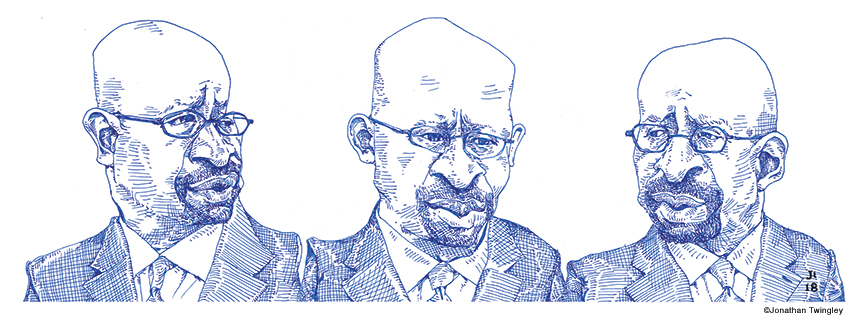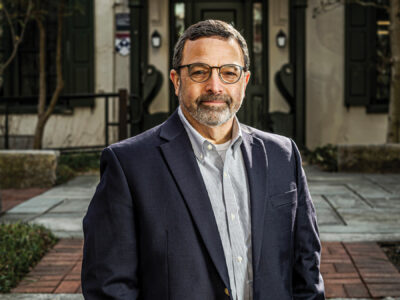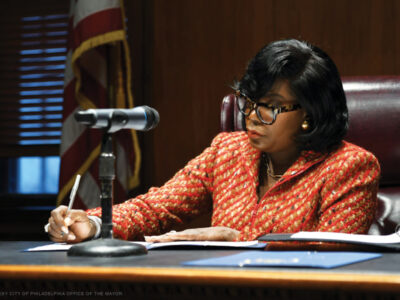
What the Great Recession taught Michael Nutter.
In his recent book Mayor, Michael Nutter W’79 makes the case for his subtitle—The Best Job in Politics —and offers an autobiography of sorts, from his days growing up in a close-knit West Philadelphia neighborhood and as a student at Penn, his entry into Philadelphia politics by way of meeting people at the club where he was working as a DJ, and his 15 years of service on City Council and through two terms as Philadelphia’s mayor from 2008 to 2016.
Nutter’s initial mayoral campaign, in which he bested four better-known and/or better-funded opponents in the Democratic primary, was seen as the longest of long shots—a Gazette article published soon after he’d beaten the odds referenced that conventional wisdom in its title, “The Man Who Would Never Be Mayor” [Jan|Feb, 2008].
At a book launch and discussion held at Perry World House back in February, Nutter and Penn Provost Wendell Pritchett Gr’97, who served in several capacities during the Nutter administration, reminisced about the campaign and their time in City Hall. Many of the promises Nutter laid out in that first run were in fact fulfilled, Pritchett noted, from reducing the rate of homicides and increasing the rate of high school graduation, to reversing the city’s decades-long population loss and improving the business climate.
But it’s fair to say that Nutter’s time in office was shaped at least as much by an event perhaps even more unanticipated than his election—the Great Recession that started the following year. In the following passage from Mayor , he reflects on his administration’s disciplined response and meditates more generally on how elected officials should approach the crises that arise on their watch.
The positive dividends of our decision making during the 2008/2009 financial and economic crisis were largely deferred, which is true of many mayoral decisions. Much of the energy and dynamism that’s happening in Philadelphia today—its best bond rating in 30 years and its booming real estate investments—are the fruits of decisions and choices seeded years earlier during the abyss of the Great Recession. Because of the measures we took, coming out of the recession we were one of the only big cities in America to have our bond rating upgraded, and in 2017 we have an A rating from all three agencies for the first time since the 1970s. Recession decisions set the stage for the “hot” city that Philly is today.
One of the great tragedies of politics today is its shortsightedness. As mayor, or as any elected public servant, it’s good to come to grips with the fact that many of the things that you want to achieve—good things—will go unnoticed. Or, you won’t get credit for them. Or, many will complain about them. Perhaps 20 years down the road your contribution will be acknowledged, and you’ll be thanked. If you’re not willing to make that level of commitment and to personally sacrifice your own ego and any narcissism for the sake of deferred and often uncredited achievements and successes, then you should avoid public service and electoral politics. If you have a deep-seated need to be loved and admired every day, you shouldn’t be in politics. You should go work at a pet shop. My motto was to manage for the present and prepare for future.
As mayor, you don’t pick your moments; the moments pick you. I would not have chosen to grapple with an economic meltdown as mayor, but I think I was in the right place at the right time, and if I was put here on this earth to do something, then maybe the management of this crisis was it.
As for lessons learned, first, try to pick a good time to run for office! Barring this prescience of pending disaster, it’s important to remember your core values, and everything else can—and probably will—get negotiated. My core values for Philadelphia were distilled in the litmus test for any decision or action: will this make the city safer, smarter, more sustainable, and its neighborhoods and people healthier? As mayor you need to believe in something, care about something, and understand that your decisions will affect other people’s lives, not only in the here and now, but years down the road. If not, then you’ll be cavalier in your decision making or you’ll follow the opinion of the last person you happen to talk to, because you lack your own core beliefs by which to navigate. Almost everything else can be negotiated, so long as it doesn’t violate your fundamental personal principles.
For example, I had, literally, led a march to force a reduction in taxes while on the City Council in 2002. Subsequently, when I was mayor, from 2008 to 2010 during the recession, I raised taxes. It was a terrible conflict for me and it violated every economic, philosophical, and business belief that I had—but it was not a core personal value not to raise taxes, ever, and I was committed to paying our public employees, delivering city services, and not running out of cash.
You don’t always, or even frequently, get to do what you want to do, but you can always do the things that you have to do well. You can do them competently, ethically, and in accordance with your core values.
Excerpted with permission of the University of Pennsylvania Press from Mayor: The Best Job in Politics, by Michael A. Nutter. Copyright © 2018 Michael A. Nutter (www.upenn.edu/pennpress).




